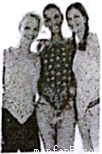
Every time we get behind the wheel of a car, we pt our lives and the lives of others at risk. Self-driving cars are designed to reduce those risks by letting technology control our vehicles.
Accident rates for self-driving cars have been much lower than the rate, for human-driven cars. 1.
As humans, we can make moral choices in avoiding accidents. To avoid hitting a child, for example, human drivers might sharply turn a car away from the child even if others may be injured. 2. Researchers studied this issue. They have developed the Moral Machine website to help explore the choices self-driving cars should make.
3. . You are shown two possible traffic situations and you choose between them. An accident will take place. You choose how many living beings would be hurt or killed.
In one situation there may be a female doctor, a child, two dogs and a homeless person who would be killed. In the other situation, you might have two babies and a cat who would be killed. 4.
The Moral Machine website has many situations and many possible outcomes. When you click on the situation of your choice, it will be highlighted. 5. At the end of the situation, you are shown the results, based on the choices you made. The results show which character you were most likely to save and which character you were most likely to have die.
A. Who should those victims be?
B. Then the next situation appears.
C. You choose who lives and who dies.
D. You can use the Moral Machine to be the judge.
E. But what moral choices can self-driving cars make?
F. The Moral Machine website lets you choose how you would react in a collision.
G. Google’s self-driving car has had only 13 collisions after traveling 1.8 million miles.
科目:高中英语 来源:黑龙江省哈尔滨市2016-2017学年高二下学期期中考试英语试卷 题型:完形填空
All you will leave behind for the world to remember is your legacy(遗产), but what legacy will you leave?
I had a philosophy(哲学)professor, whose untidy appearance was highlighted(突出)by a _______sport coat and poor-fitting thick glasses, which often _______on the tip of his nose. Every now and then, as most philosophy professors do, he would go off on one of those hard-to-understand “what’s the meaning of _______” discussions. Many of those discussions went_______, but there were a few that really hit home(切中要害). This was one of them.
“_______to the following questions by a _______of hands,” my professor instructed.
“How many of you can tell me something about your parents” Everyone’s hand _______.
“How many of you can tell me something about your grandparents” About three-fourths put up their hands.
“How many of you can tell me something about your great-grandparents” Two out of sixty students _______their hands.
“Look around the room,” he said, “In just two short generations _______any of us even know ________our own great-grandparents were. Oh sure, maybe we have an old photograph in a musty(发霉的)cigar box. ________ maybe we know the classic family________about how one of them walked five miles to school barefoot. But how many of us __________know who they were, what they thought, what they took pride in, what they were afraid of, or what they dreamed about? Think about that. Within three generations our ancestors are all but forgotten. Will this __________to you?”
“Here’s a better question. Look __________three generations. You are long ________. Instead of you sitting in this room, now it’s your great-grandchildren. What will they have to say __________you? Will they know about you or will you be ________, too?”
“Is your life going to be a ________or an example? What legacy will you leave? The__________is yours. Class dismissed.”
Nobody rose from their seats for five minutes.
1.A. well-designed B. well-worn C. well-ironed D. well-cut
2.A. ran B. stood C. rested D. lay
3.A. life B. family C. work D. study
4.A. somewhere B. anywhere C. everywhere D. nowhere
5.A. Answer B. Respond C. Contribute D. Relate
6.A. show B. clap C. touch D. rub
7.A. went down B. went up C. went around D. went forward
8.A. rose B. arose C. raised D. aroused
9.A. almost B. nearly C. no D. hardly
10.A. what B. where C. which D. who
11.A. Or B. And C. But D. So
12.A. history B. story C. tree D. song
13.A. simply B. roughly C. generally D. really
14.A. happen B. belong C. refer D. pass
15.A. back B. ahead C. for D. around
16.A. ready B. alive C. gone D. lost
17.A. to B. for C. behind D. about
18.A. forgotten B. remembered C. respected D. scolded
19.A. learning B. meaning C. warning D. turning
20.A. way B. reason C. explanation D. choice
查看答案和解析>>
科目:高中英语 来源: 题型:填空题
查看答案和解析>>
科目:高中英语 来源: 题型:填空题
查看答案和解析>>
科目:高中英语 来源:黑龙江省哈尔滨市2016-2017学年高二下学期期中考试英语试卷 题型:阅读理解
Recently my husband had his Achilles tendon(跟腱) cut when feeding a chicken. When sitting in the doctor’s office waiting for surgery stressfully, I decided to treat myself for a minute and start to read about “The Little House on the Prairie”. Suddenly I felt my life seemed like a slack(懈怠) compared to the Ingalls who do all their washing and cooking but they feel so happy. Their every happiness is created from the work with their own hands. Yet I’m walking around feeling sorry for myself because I’m picking up the slack! So I’m thinking “Work it out! Get up and get busy.”
It really is true. I realize that I’m happiest when accomplishing tangible(有形的) productive work—working in the yard and washing my dishes—brings me happiness. This does not surprise Kelly Lambert Ph.D. She has been researching the phenomenon she calls “effort-rewards”. When you do meaningful work with your hands, a kind of neurochemical feedback floods your brain with dopamine and serotonin. These happy brain chemicals are natural antidepressants, and we’ve evolved to release them both to reward ourselves for working with our hands and to motivate ourselves to do it some more. Dr. Lambert says Americans have become more depressed in recent years and at the same time we’ve experienced a decrease in purposeful physical activity. Did we lose something vital to our mental health when we started pushing buttons instead of ploughing the fields?
Dr. Pansinski says she gets that happy look when she prepares a meal at the end of a day. “We are programmed to reward ourselves when we accomplish things with our hands. For so many people, it just feels as though everything’s going so fast—life, kids, hundreds of e-mails a day. There is so little you can really see and hold on to. Working with one’s hands is a way to slow down, to take pleasure in life again.”
1.Before reading “The Little House On the Prairie”, the writer might think the Ingalls were ________.
A. unknown B. hardworking
C. foolish D. unhappy
2.The writer develops the first paragraph in a way of ________.
A. giving an example B. making a comparison
C. analyzing a cause D. asking a question
3.From Kelly Lambert Ph. D, we know that ________.
A. her “effort-rewards” is popular among American people
B. working with our hands makes our brain tired easily
C. a decrease in physical work causes people in low mood.
D. we should work with our hands instead of using machine
4.From what Dr. Pansinski says, we can conclude that ________.
A. time and tide wait for no man
B. we should lower our expectation for life
C. it’s better to leave today’s work to tomorrow
D. we should never hurry our life too much
查看答案和解析>>
科目:高中英语 来源:四川省内江市2017届高三第五次模拟考试英语试卷 题型:书面表达
Mary是—位美国中学音乐老师,一直喜欢中国音乐。她下个月要为在暑假到中国游学音乐的中学生作—个关于中国古典音乐的讲座,但她在短时间内无法找到足够的资料,于是就给她的中国网友李华发邮件求助。请你以Mary的名义,用英语给李华写一封邮件。
要求:
1.词数:l00词左右;
2.文中不能出现自己的姓名和所在学校的名称;
3.可适当增加细节,以使行文连贯;
4.参考词汇:古典:classical。
___________________________________________________________________________________________
___________________________________________________________________________________________
___________________________________________________________________________________________
___________________________________________________________________________________________
___________________________________________________________________________________________
___________________________________________________________________________________________
________________________________________________________________
查看答案和解析>>
科目:高中英语 来源:四川省内江市2017届高三第五次模拟考试英语试卷 题型:阅读理解
Look at any advertisement for a fashion(时尚)store,and you may notice that most of the models are teens.In Western culture,especially,fashion is an extremely important component of teenage life.But "Why?" you may ask.
For teenagers,fashion is first and foremost a social statement.It is a means of expression to their peers(同龄人)and the rest of the world.
Fashion also provides teenagers a sense of identity by signalling which "grouping" they belong to.It many signal a more independent or inclusive personality.
Teens can be extremely conscious about overall image.They will often make use of fashion as a means to attract a certain type of person.
Rebellion(叛离)may also be acted out via fashion.Since rebellion is often a huge aspect of a teenager's life, teens often use shocking fashion to rebel against their parents,their classmates, and/or society.
Many teens pick up on fashion trends in an effort to avoid losing face.Poor fashion choices in the eyes of others can often be an open door to ridicule.
Often,fashion for teenagers is the result of the desire to be like a celebrity(名人).Celebrities are perhaps the greatest influences on teenagers in the modern world,and the can have a huge effect on a teen's ideas about fashion and its importance.





1.What is the best tide for the text?
A. Why is fashion so important to teens? B. Why do teens learn from celebrities?
C. What fashion do teens want? D. Who leads the fashion?
2.For teens,fashion .
A. has a deep effect on celebrities B. is about expressing themselves
C. can prevent them from rebelling D. will remove their peer pressure
3.Which of the following can describe the main point of Paragraph 3?
A. Fashion and independence. B. Fashion and peers.
C. Fashion and teenagers. D. Fashion and identity.
查看答案和解析>>
科目:高中英语 来源:云南省昆明市2017届高三5月复习适应性检测英语试卷 题型:阅读理解
Parents may think they’re smart about where they store medicines, but their kids are smarter. Nearly 60,000 young children are rushed to the hospital every year after getting into medicines not meant for them, according to a new report from Safe Kids Worldwide.
The report finds little connection between what parents know about storing medicines safely and what they actually do. Nine out of 10 parents know that medicines should be stored up and away out of reach and sight, but 7 out of 10 of them admit not doing that. They leave medicines out on kitchen counters, sinks and sofas, believing babies and toddlers(学步者)aren’t tall enough or strong enough to reach them. Unfortunately, they probably can. Children as young as a month have ended up in an emergency department because they’d been poisoned by getting into a medicine that was left within reach.
Most poisonings related to medicines---particularly among babies and toddlers---occur within their home. Kids develop rapidly and they want to explore their environment. At certain ages they have a lot of hand-to-mouth activity, and so it’s very common for them to explore their environment and then try to taste what they find.
The new Safe Kids worldwide report includes a survey of 2,000 parents with children under age 6. While the number of children visiting an emergency department for accidental poisonings had declined since the 2010 maximum, the decline has slowed in recent years.
Prescription and over-the-counter medicines cause the most severe poisonings, but vitamins and supplements(补充品)can also cause problems. There are steps families can take to lower the risk for an accidental medicine poisoning.
1.Why are children poisoned according to the text?
A. Some of the medicines at home taste nice
B. There is something poisonous in medicines
C. Kids have easy access to medicines at home
D. Kids are curious to explore the environment
2.What can we learn from the text?
A. Vitamins and supplements can do good to kids
B. The team made a survey of 2,000 kids under age 6
C. 600 parents surveyed could keep medicines properly
D. Kids are usually smart at storing medicines at home
3.What could be the best title for the text?
A. Parents’ Casual Behavior Leads to Kids Poisoned
B. The Number of Kids Poisoned Has Declined Lately
C. Nearly 60,000 Children Are Poisoned by Medicines
D. Kids Are Facing the Risk of Being Poisoned at Home
查看答案和解析>>
科目:高中英语 来源: 题型:选择题
| A. | Never mind | B. | That's right | C. | No problem | D. | Let's go |
查看答案和解析>>
湖北省互联网违法和不良信息举报平台 | 网上有害信息举报专区 | 电信诈骗举报专区 | 涉历史虚无主义有害信息举报专区 | 涉企侵权举报专区
违法和不良信息举报电话:027-86699610 举报邮箱:58377363@163.com